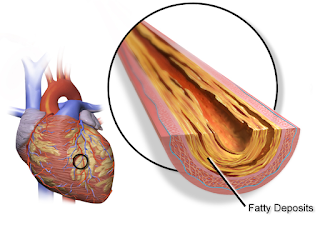Possible Breakthrough: Reversing Atherosclerosis through Non Invasive Nanofibers
Reversing Atherosclerosis through Non-Invasive Nanofibers
by LeeJ Keller
In what could be a very interesting breakthrough in nanotechnology applied to a common cause of death in the modern world (heart disease), researchers recently disclosed some early research that resulted in a non-invasive reversal of atherosclerosis in an animal model.
While posting to my Twitter Feed (@LeeJKeller) the other day, I came across this interesting study. The general news piece was found over at Big Think and was headlined as A New Technique Could Eliminate Heart Disease With a Single Injection which of course, when I saw it, really caught my attention. I knew that heart disease is one of the biggest killers in the world, (the second leading cause of death in the USA after cancer), and here is a study that uses a nanotech intervention that could help address this huge killer. A Press Release describing the research reveals that it was a presentation at a recent American Heart Association conference which was about Vascular Approaches in Biology. The PR webpage is titled: Preliminary Research Shows Non-Invasive Therapy May Reverse Atherosclerosis .
Basically, I knew that atherosclerosis was a result of plaque buildup in heart arteries that were also related to bad cholesterol in the fatty diets that so many people have. This narrows the arteries and can lead to severe blockages. In many cases, medications known as statins have been taken to help reduce the buildup and in some cases, surgical stents have been put in to open up the arteries. (I knew a lot about the history of stents and the different kinds of stents having once lectured on this at Cook Medical Group's Shanghai office). But here, was a research that held the promise of no longer needing these interventions. So it piqued my interest. Saving lives? Non-invasive? Nanotech applied to nanomedicine?
Basically, this research shows that custom nanofibers were produced in a laboratory and these were made up of particles that would remove plaque from arterial walls and then dissolve afterward. These were basically synthetic self-assembling peptides that promote the breakdown of cholesterol. This was done by an assembly of amino acids designed just for that purpose. These were delivered by injection.
In the mouse model that was used, mice who had been given fatty diets, and who had been genetically modified to develop atherosclerosis, were given high-fat diets for 14 weeks. These mice were injected with the cholesterol-fighting peptides. The researchers used imaging and other techniques to determine that the designed peptides were binding to atherosclerosis. After eight weeks of treatment, male mice had an 11% reduction in atherosclerosis. The results were reproducible.
Although the researchers noted the research results are preliminary and more needs to be done before trying this out on humans; if the results remain robust surely human trials are not far away. The results could be the eventual eradication of this cause for heart disease.~~LJK

Comments